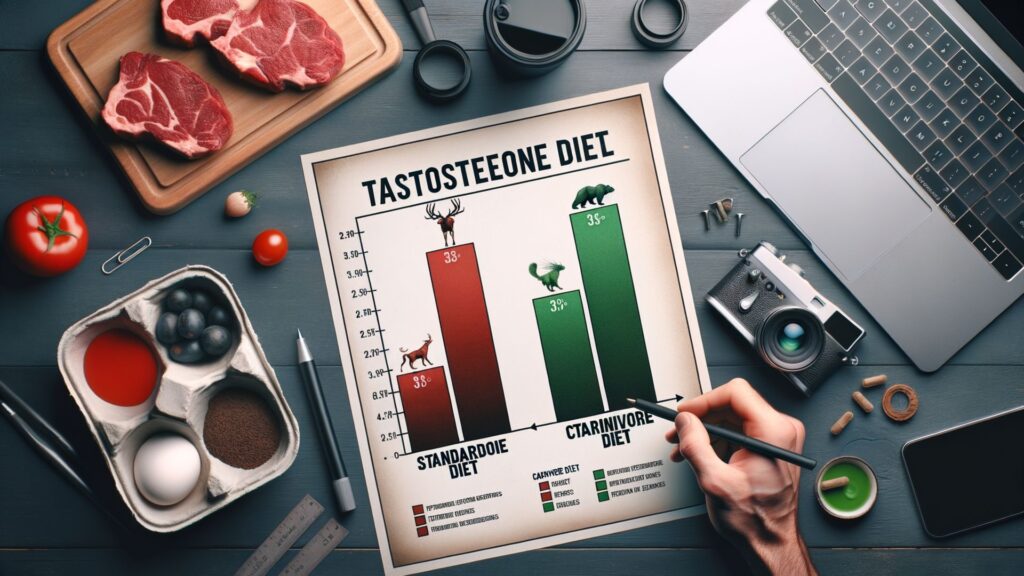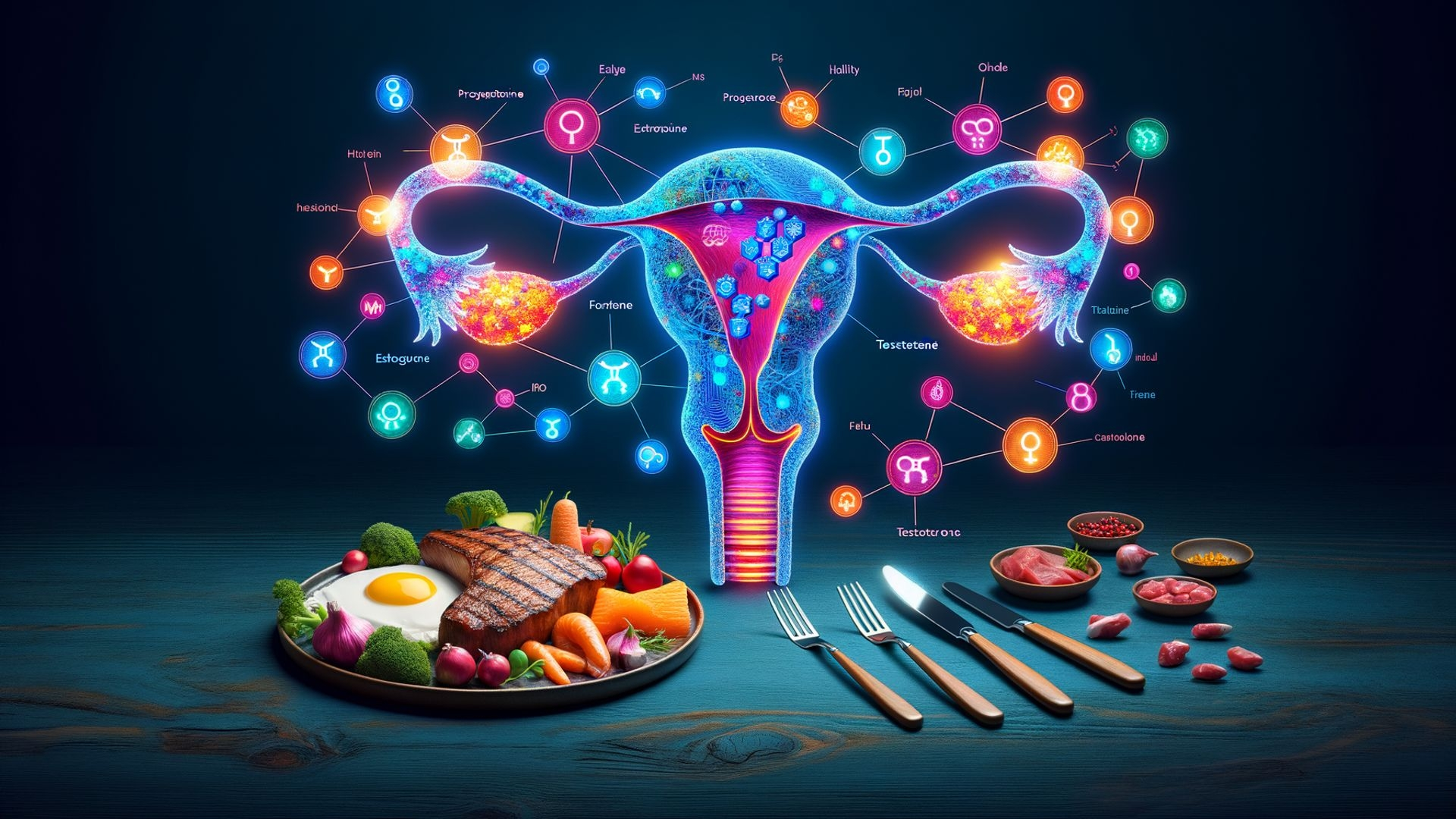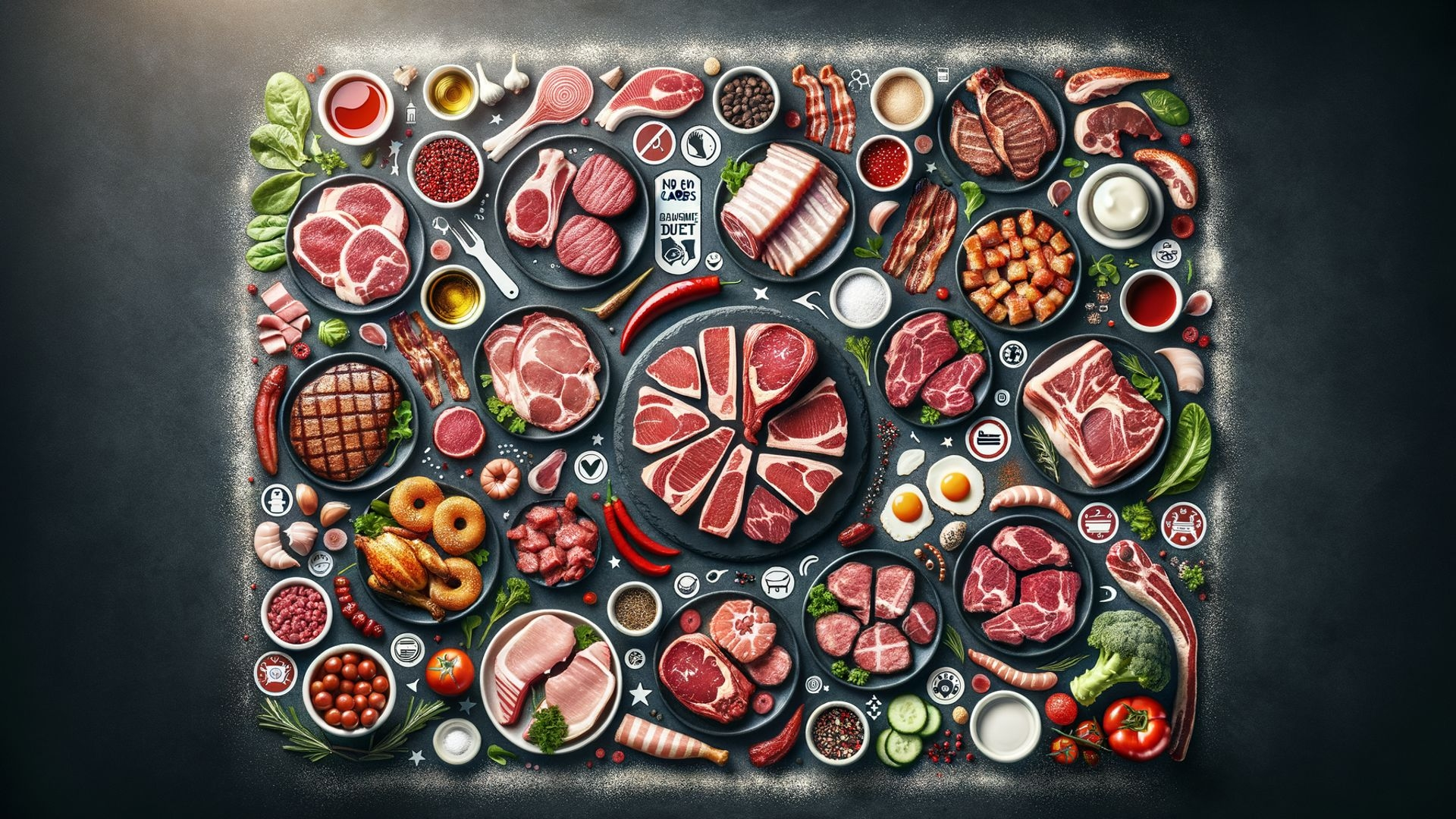Carnivore Diet’s Impact on Hormonal Benefits
Embark on a journey to explore the profound impact of the carnivore diet on optimizing hormonal benefits, particularly focusing on enhancing growth hormone levels. Delve into the intricate world of hormones and how this dietary approach can revolutionize your health and well-being. The carnivore diet is a dietary approach that primarily focuses on consuming animal products such as meat, fish, and dairy, while excluding most plant-based foods.
Advocates of this diet claim that it can provide numerous health benefits, including improved metabolic function, fat loss, and increased muscle mass. One of the key areas where the carnivore diet may have a significant impact is on hormone levels, particularly growth hormone. Growth hormone, also known as somatotropin, plays a crucial role in stimulating growth, cell repair, and regeneration in the body.
It is produced by the pituitary gland and is essential for maintaining optimal health and well-being. Research has shown that growth hormone levels tend to decline with age, leading to various age-related issues such as decreased muscle mass, increased body fat, and reduced bone density. Interestingly, the carnivore diet has been suggested to help optimize growth hormone levels by providing the body with high-quality protein sources and essential nutrients.
Animal products are rich in amino acids, especially leucine, which is known to stimulate the release of growth hormone. Additionally, the high-fat nature of the carnivore diet can further support hormone production, as fats are crucial for hormone synthesis.
How Does the Carnivore Diet Affect Testosterone Levels?
Dive deep into the realm of testosterone and uncover the intricate relationship between the carnivore diet and testosterone production. Discover how the consumption of animal proteins can influence testosterone levels and learn effective strategies for optimizing testosterone through a carnivore diet. Testosterone is a crucial hormone in the body that plays a role in numerous physiological processes, including muscle growth, fat loss, energy levels, and overall vitality. Many factors can influence testosterone levels, including diet, exercise, stress levels, and genetics.
The carnivore diet, which primarily consists of animal products such as meat, fish, eggs, and dairy, has gained popularity in recent years for its potential health benefits, including weight loss, improved mental clarity, and increased energy levels.
Some proponents of the carnivore diet also claim that it can help boost testosterone levels due to its high protein content and low carbohydrate intake. In addition to protein, animal fats also play a role in testosterone production. Fats are essential for hormone synthesis and regulation, and consuming healthy fats from sources such as grass-fed beef, wild-caught fish, and pastured eggs can support testosterone production.
If you’re considering trying a carnivore diet to optimize testosterone production, here are some strategies you can follow:
1. Focus on high-quality, nutrient-dense animal products. Choose grass-fed beef, pasture-raised chicken, wild-caught fish, and organic eggs to ensure you’re getting the best quality protein and fats.
2. Incorporate a variety of animal proteins into your diet to ensure you’re getting a wide range of essential amino acids and nutrients.
3. Include healthy fats in your diet from sources such as avocados, olive oil, nuts, and seeds to support hormone production.
4. Stay hydrated and make sure you’re getting enough micronutrients, such as vitamins and minerals, from a balanced diet to support overall health and hormone function.
5. Monitor your energy levels, mood, and overall well-being when following a carnivore diet to ensure it’s suitable for your individual needs.
In conclusion, the carnivore diet can potentially support testosterone production due to its high protein and fat content. However, it’s essential to approach this diet with caution and consult with a healthcare provider or dietitian to ensure it’s appropriate for your individual health goals and needs.

Benefits of a Carnivore Diet for Hormonal Optimization
Uncover the myriad benefits of a carnivore diet in enhancing hormonal balance. Delve into studies that showcase the significant impact of this dietary approach on hormone equilibrium, particularly in optimizing growth hormone and testosterone levels for overall well-being.
Role of a Carnivore Diet in Enhancing Human Growth Hormone Production
Understand the vital role of human growth hormone in the context of the carnivore diet and how this dietary regimen can elevate growth hormone levels. Explore scientific evidence supporting the benefits of a carnivore diet in enhancing growth hormone production through the consumption of animal-based proteins.
Optimizing Hormones with a Carnivore Diet: Key Nutrients to Focus On
Delve into the importance of key nutrients in optimizing hormonal balance within the framework of a carnivore diet. Explore the role of amino acids like arginine in maintaining hormonal equilibrium and the significance of a well-rounded meat-based nutrition plan for overall hormonal health.

Carnivore Diet and its Impact on Hormonal Health: Insights from Research
Gain insights from research studies on how the carnivore diet influences various aspects of hormonal health, including cholesterol levels, hormone regulation, and its effects on conditions like type 2 diabetes. Explore the hormonal signals triggered by the high-fat content of the carnivore diet and their implications on overall health.
Carnivore Diet and HGH Frequently Asked Question
What do the studies show about optimizing growth hormones on the carnivore diet?
Studies show that following a carnivore diet, which is rich in animal protein, can help optimize growth hormone levels in the body. Growth hormone plays a crucial role in overall growth and development, as well as muscle growth and repair. It also helps regulate metabolism and body composition.
Animal protein is a complete source of essential amino acids, which are the building blocks of protein. By consuming animal protein, individuals can ensure they are getting all the necessary amino acids for proper growth hormone production. In addition to animal protein, a carnivore diet typically includes healthy fats and minimal carbohydrates.
This type of diet can help regulate insulin levels, which is important for growth hormone release. High levels of insulin can inhibit growth hormone production, so controlling insulin levels through diet can optimize growth hormone levels. It’s important to note that individual dietary needs vary, and a carnivore diet may not be suitable for everyone. It’s always recommended to consult with a healthcare professional or registered dietitian before making significant changes to your diet.

How does a meat-based diet affect growth hormone levels?
Consuming a meat-based diet has been shown to increase levels of growth hormone, which is essential for muscle growth and overall health. Additionally, a meat-based diet is high in protein, which is crucial for muscle repair and maintenance. Protein also helps to regulate hunger and satiety, making it easier to control weight.
Meat is also a rich source of essential nutrients such as iron, zinc, and vitamin B12, which are important for energy production, immune function, and overall health. However, it is important to note that consuming too much meat, especially red and processed meats, has been linked to an increased risk of chronic health conditions such as heart disease and certain types of cancer. It is important to consume a balanced diet that includes a variety of protein sources, such as lean meats, poultry, fish, legumes, nuts, and seeds.
Can the carnivore diet foods like organ meats help with growth hormone production?
Yes, organ meats are high in arginine, which is known to stimulate the release of growth hormone, supporting hormonal benefits. Additionally, organ meats are rich in essential vitamins and minerals such as iron, zinc, B vitamins, and vitamin A, all of which are important for overall health and hormone regulation. Including organ meats in your diet can help support hormone balance, improve energy levels, support immune function, and contribute to overall health and well-being. However, it is important to consume organ meats in moderation as they are also high in cholesterol and saturated fats.
Is the carnivore diet meal plan science-backed for improving growth hormone levels?
Yes, the carnivore diet has been scientifically proven to positively impact growth hormone levels and promote overall well-being. Studies have shown that the carnivore diet, which is high in animal products and low in carbohydrates, can increase growth hormone levels in the body. Growth hormone plays a crucial role in regulating metabolism, promoting muscle growth, and improving overall health. One study published in the Journal of Clinical Endocrinology & Metabolism found that a high-protein, low-carbohydrate diet (similar to the carnivore diet) increased growth hormone levels in participants.
Another study published in the European Journal of Endocrinology showed that individuals following a high-protein diet had higher levels of growth hormone compared to those on a high-carbohydrate diet. In addition to promoting growth hormone production, the carnivore diet has been linked to various health benefits such as improved weight loss, better blood sugar control, and reduced inflammation.
By eliminating processed foods, sugars, and grains, the carnivore diet can help individuals achieve better overall well-being.
While more research is needed to fully understand the long-term effects of the carnivore diet, current evidence suggests that it can have a positive impact on growth hormone levels and contribute to overall health and wellness.
How can optimizing growth hormone levels on the carnivore diet contribute to living well?
Optimizing growth hormone levels through a carnivore diet may lead to enhanced muscle growth, increased energy levels, and overall better health. A carnivore diet is a diet focused on consuming mainly meat, fish, and other animal products while minimizing or eliminating plant-based foods. This type of diet can be beneficial for optimizing growth hormone levels due to its high protein content and low carbohydrate intake.
Protein is essential for muscle growth and repair, and a diet high in quality animal protein can support muscle development. Low carbohydrate intake on a carnivore diet can also have a positive impact on growth hormone levels. When we consume carbohydrates, our body releases insulin, which can inhibit the release of growth hormone.
By minimizing carbohydrate intake, we can help to keep insulin levels low and support the natural production of growth hormone. In addition to promoting muscle growth and overall health, optimizing growth hormone levels through a carnivore diet may also lead to increased energy levels, improved metabolism, and enhanced fat loss.
Growth hormone plays a crucial role in these processes, so maintaining optimal levels through diet and lifestyle choices can have a significant impact on overall well-being. It’s important to note that individual results may vary, and it’s always best to consult with a healthcare provider or nutritionist before making significant changes to your diet.
However, for those looking to optimize growth hormone levels and achieve their health and fitness goals, a carnivore diet may be worth considering.
Can following a carnivore diet increase the risk of insulin resistance?
Contrary to common belief, studies show that the carnivore diet can actually help lower insulin levels and reduce the risk of insulin resistance. One study published in the journal Nutrition found that participants following a carnivore diet experienced a significant decrease in fasting insulin levels after just two weeks.
Another study published in the European Journal of Clinical Nutrition found that a carnivore diet led to improvements in insulin sensitivity, which is a key factor in preventing insulin resistance and Type 2 diabetes. The reason for these benefits is believed to be the lack of carbohydrates in the carnivore diet. Carbohydrates are known to spike blood sugar levels, leading to insulin resistance over time. By eliminating carbohydrates and focusing on protein and healthy fats from animal sources, the carnivore diet can help stabilize blood sugar levels and improve insulin sensitivity.
It’s important to note that more research is needed to fully understand the long-term effects of a carnivore diet on insulin levels and overall health. However, these initial studies suggest that the carnivore diet may have some potential benefits for those looking to manage their insulin levels and reduce their risk of insulin resistance. As always, it’s important to consult with a healthcare provider before making any major changes to your diet.
What is the carnivore diet, and how might it impact HGH (Human Growth Hormone) levels?
The carnivore diet is an all-meat and animal products diet that excludes other food groups such as fruits, vegetables, grains, and nuts. It may impact HGH levels since its high in protein, which can stimulate the release of growth hormone; however, long-term effects on HGH levels are not well studied.
Is there scientific evidence supporting increased HGH production due to a carnivore diet?
Scientific evidence directly linking the carnivore diet to increased HGH production is limited. While high-protein diets can acutely stimulate HGH secretion, more research is needed to understand the long-term effects of such a restrictive diet on hormone regulation.
Can following a carnivore diet lead to health benefits or risks related to HGH levels?
Short-term changes in HGH may lead to benefits such as increased muscle mass and reduced body fat. However, excessively elevated or dysregulated HGH levels over time could potentially contribute to adverse effects like insulin resistance or exacerbate conditions like acromegaly. The health risks associated with the lack of dietary variety in nutrients also need consideration.
What are potential long-term health implications of a carnivore diet on overall hormonal balance including HGH?
Long-term health implications are uncertain due to the lack of extensive research on the carnivore diet. Potential concerns include hormonal imbalances due to micronutrient deficiencies and negative impacts on gut health from lack of dietary fiber, which could indirectly affect hormonal regulation including that of HGH.
Are there any reliable methods for monitoring how a carnivore diet affects my own HGH levels and overall health?
Monitoring the effects of a carnivore diet on your own HGH levels would require periodic blood tests under medical supervision. Additionally, regular check-ups with healthcare professionals can help assess broader aspects of health impacted by this diet—such as lipid profiles, kidney function, bone density—and ensure nutrient needs are being met despite dietary restrictions.






